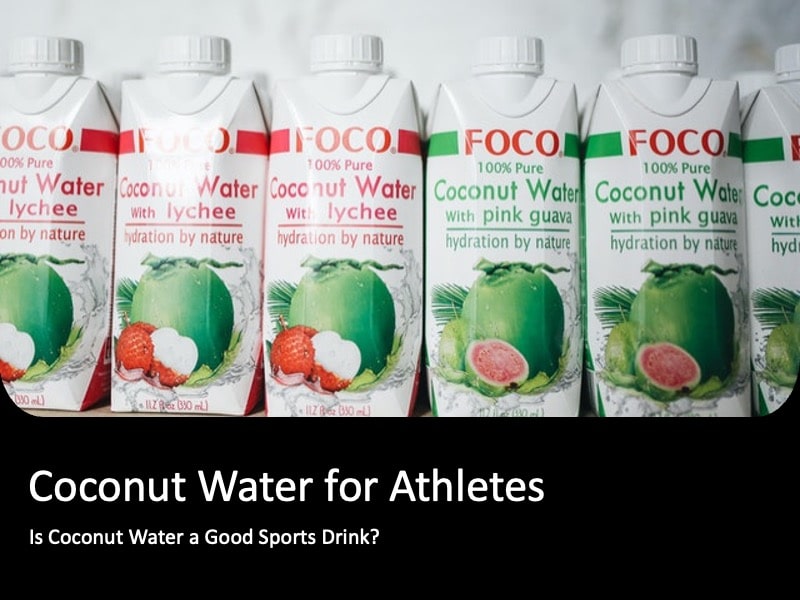Coconut Water for Athletes: Is It a Good Hydration Drink?
Coconut water for athletes has gained widespread attention as a natural alternative to traditional sports drinks, but its actual effectiveness for hydration and recovery requires a closer, evidence-based look.
Its rise in the fitness and wellness world is backed by a booming market, with projections showing an expected growth to $4.2 billion in the U.S. by 2028 (Technavio, 2024).
With endorsements from influencers and major beverage brands, many athletes are turning to coconut water as a go-to drink before, during, and after training.
Despite the hype, not all hydration drinks are created equal—and coconut water’s unique composition raises important questions for performance-driven individuals.
While it delivers key electrolytes like potassium and magnesium and has a light, refreshing taste, its low sodium content and high potassium concentration could make it a suboptimal choice in certain training situations.
Understanding when and how to use coconut water can help athletes make informed hydration choices that enhance both safety and performance.
Nutrient Composition of Coconut Water
Coconut water is valued for its naturally occurring mix of electrolytes, carbohydrates, and bioactive compounds, which give it a unique profile compared to other hydration beverages.
For athletes seeking functional fluids, understanding the nutrient composition of coconut water is essential for optimizing performance, recovery, and overall health.
Key Electrolytes
Coconut water’s primary nutrient is potassium, with one cup (240 mL) typically providing around 600 mg, or about 13% of the recommended daily intake.
This makes it significantly richer in potassium than most sports drinks and even more than a banana.
It also contains smaller but meaningful amounts of other electrolytes:
- Magnesium: ~60 mg per cup
- Calcium: ~58 mg per cup
- Phosphorus: ~48 mg per cup
- Sodium: ~250 mg or less, depending on the variety
While these electrolytes are vital for muscle contraction, nerve transmission, and fluid balance, the relatively low sodium and high potassium content can create an imbalance during periods of heavy sweating.
Carbohydrates and Sugar Content
Coconut water provides approximately 9 grams of carbohydrates per 240 mL, mostly in the form of naturally occurring sugars such as glucose and fructose.
This amount is lower than most commercial sports drinks, which typically offer 14–18 grams per serving, but still sufficient for light to moderate-intensity workouts.
The glycemic index of coconut water is low to moderate, making it a gentle energy source that doesn’t spike blood sugar as quickly as high-sugar sports beverages.
Additional Bioactive Compounds
Coconut water contains cytokinins—plant hormones with potential antioxidant and anti-inflammatory effects—as well as trace B vitamins, amino acids, and phytonutrients, all of which may support recovery and general health (Yong et al., 2009).
Why is Coconut Water Appealing for Athletes?
Coconut water contains naturally occurring electrolytes such as potassium, magnesium, calcium, and small amounts of carbohydrates, making it similar in some respects to traditional sports drinks.
Its light, slightly sweet flavor also makes it more palatable for many individuals during and after exercise.
Additionally, coconut water has been shown to have isotonic properties, meaning it contains a similar concentration of electrolytes as human blood, which can aid in fluid absorption and retention (Intan Kailaku et al., 2015).
A notable study comparing coconut water, a carbohydrate-electrolyte beverage, and plain water for rehydration found that coconut water supported whole-body rehydration similarly to other options, caused fewer gastrointestinal symptoms, and led to higher plasma glucose levels than water (Saat et al., 2002).
Key Benefits of Coconut Water for Athletes
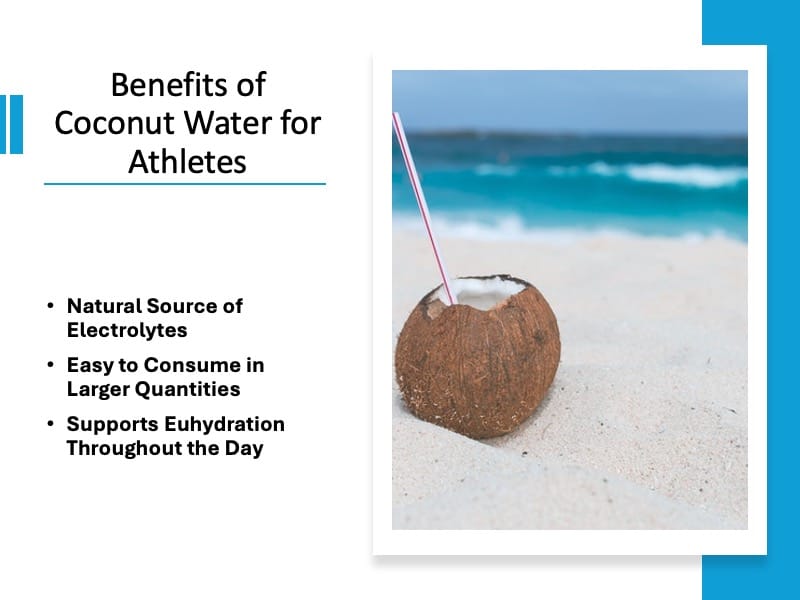
There are several benefits of coconut water for athletes, including several unique advantages that support athletic performance, recovery, and overall hydration.
While it may not be one of the best sports drinks in all situations, its natural composition provides meaningful benefits that can complement an athlete’s fluid intake strategy when used appropriately.
Natural Source of Electrolytes
Coconut water offers a balanced profile of electrolytes—particularly potassium—making it beneficial for everyday hydration.
Potassium is critical for nerve signaling, muscle function, and maintaining fluid balance.
Easy to Consume in Larger Quantities
Thanks to its mild taste and lower sugar content compared to traditional sports drinks, many athletes find it easier to drink coconut water in larger amounts without feeling bloated or overly full.
Studies have also noted that coconut water may cause less nausea and stomach upset than sports drinks or water alone (Kalman et al., 2012).
In fact, some sports drinks, like Prime Hydration, use coconut water in their formula for a naturally sweet, enjoyable taste.
Supports Euhydration Throughout the Day
For athletes looking to maintain hydration throughout a 24-hour cycle—outside of intense training sessions—coconut water may offer a supportive role, particularly when sodium losses from sweat are not a major concern.
Limitations and Concerns: Why is Coconut Water Not Good for Athletes?
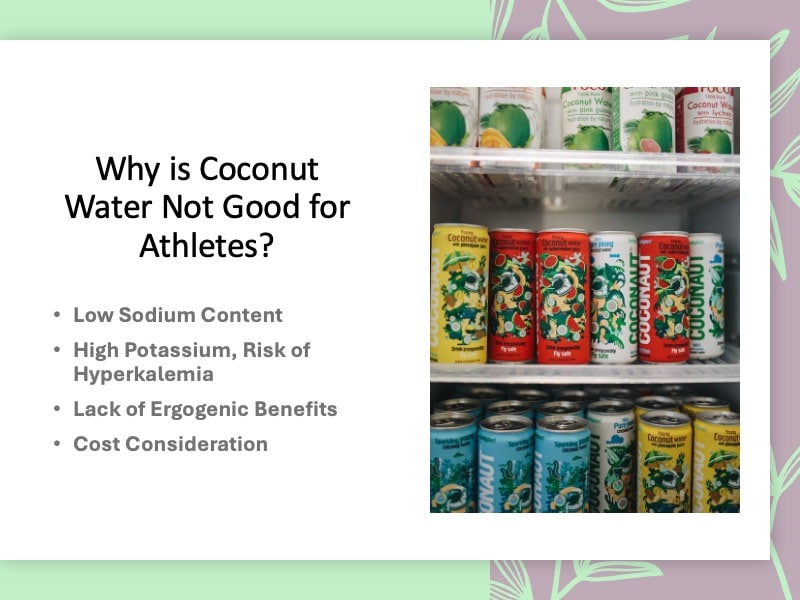
Despite its natural appeal and growing popularity, coconut water is not always an ideal hydration solution for athletes.
Several limitations—particularly its electrolyte imbalance, lack of proven performance benefits, and potential health risks—make it a less reliable choice during intense training or competition.
Understanding these concerns is essential before recommending coconut water as a primary hydration beverage.
Low Sodium Content
Sodium is the most abundant electrolyte lost through sweat, and coconut water contains significantly less sodium than traditional sports drinks.
For athletes who are “salty sweaters” or train in hot, humid conditions, relying on coconut water alone may not adequately replace sodium losses and could contribute to dehydration (Evans et al., 2017).
High Potassium, Risk of Hyperkalemia
While potassium is generally beneficial, an excessive intake—especially when combined with dehydration or certain health conditions—can increase the risk of hyperkalemia, a dangerous electrolyte imbalance.
There have been clinical reports of coconut water-induced hyperkalemia, including one instance labeled “Death by Coconut,” particularly when consumed in large quantities after exercise (Hakimian et al., 2014; Rees et al., 2012).
Lack of Ergogenic Benefits
In terms of improving physical performance, coconut water does not offer ergogenic effects.
Research comparing its use to water or sports drinks during cycling time trials found no performance benefit (Peart et al., 2017).
Cost Consideration
From a practical standpoint, coconut water is often significantly more expensive than water or homemade hydration drinks.
Given that its performance and rehydration benefits are similar or sometimes inferior to traditional options, the cost-effectiveness of coconut water is questionable for many athletes.
Is Coconut Water Bad for Athletes?
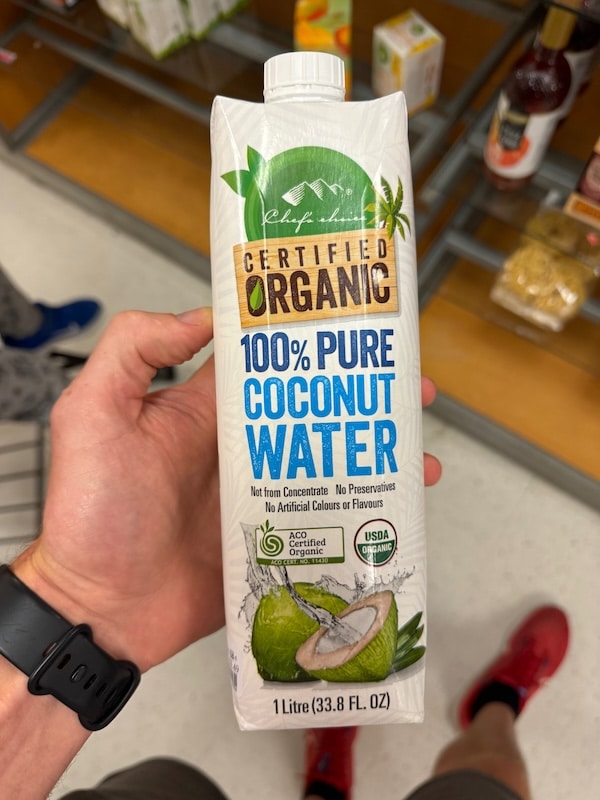
Coconut water is not inherently bad for athletes, but it’s also not universally beneficial.
Its high potassium and low sodium content can be problematic during or after intense exercise, especially for athletes with high sweat rates or significant sodium loss.
While coconut water can support general hydration and daily electrolyte intake, it falls short when rapid rehydration or electrolyte replenishment—particularly sodium—is needed.
For light workouts or as a refreshing beverage outside of training windows, coconut water can be a healthy choice.
However, for performance-focused athletes or during prolonged exercise in hot conditions, it may not provide the balanced electrolyte profile necessary for optimal recovery and hydration.
Strategic Recommendations for Coconut Water Consumption for Athletes
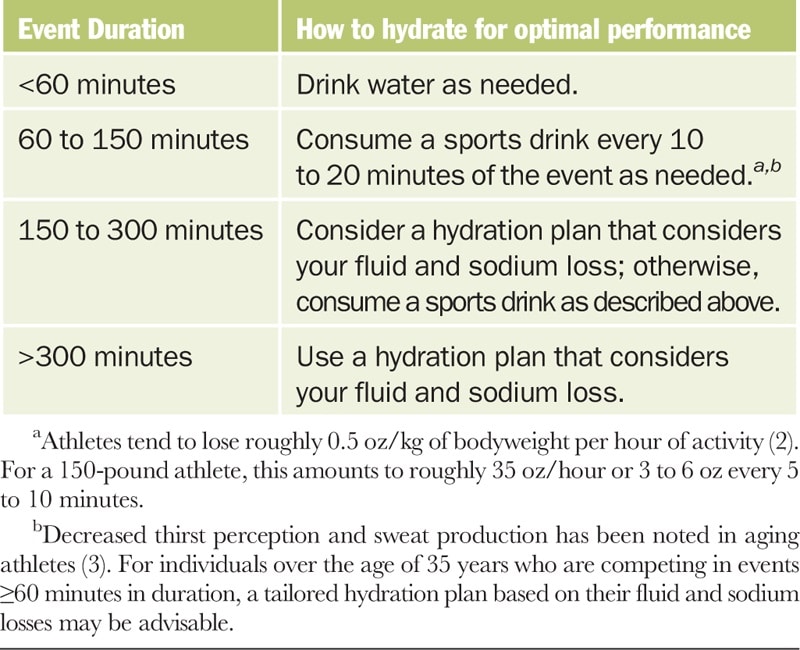
Coconut water should not be a one-size-fits-all hydration solution.
Instead, its use should be individualized based on sweat rate, electrolyte loss, training intensity, and athlete preference.
Here’s how to responsibly incorporate coconut water into an athlete’s hydration strategy:
- Before Training or Competition: Coconut water can be consumed 1–2 hours before exercise, especially on days with lower sweat losses.
- After Training: It can serve as a recovery beverage when consumed at least 3–4 hours post-exercise, particularly when meals or snacks also provide sodium and carbohydrates.
- Avoid During or Immediately After Intense Training: Especially in athletes with high sweat sodium loss, coconut water may worsen electrolyte imbalances if used during peak sweat loss periods.
- Watch for Underlying Conditions: Athletes with kidney disease, diabetes, or those on certain medications should be especially cautious due to the risk of hyperkalemia (Montford & Linas, 2017).
Best Alternatives to Coconut Water for Athletes
While coconut water has its place in a hydration strategy, many athletes benefit more from alternatives that provide a more balanced or tailored electrolyte profile.
Whether you’re training intensely, recovering from heavy sweat loss, or just aiming to stay hydrated, these options offer science-backed hydration support.
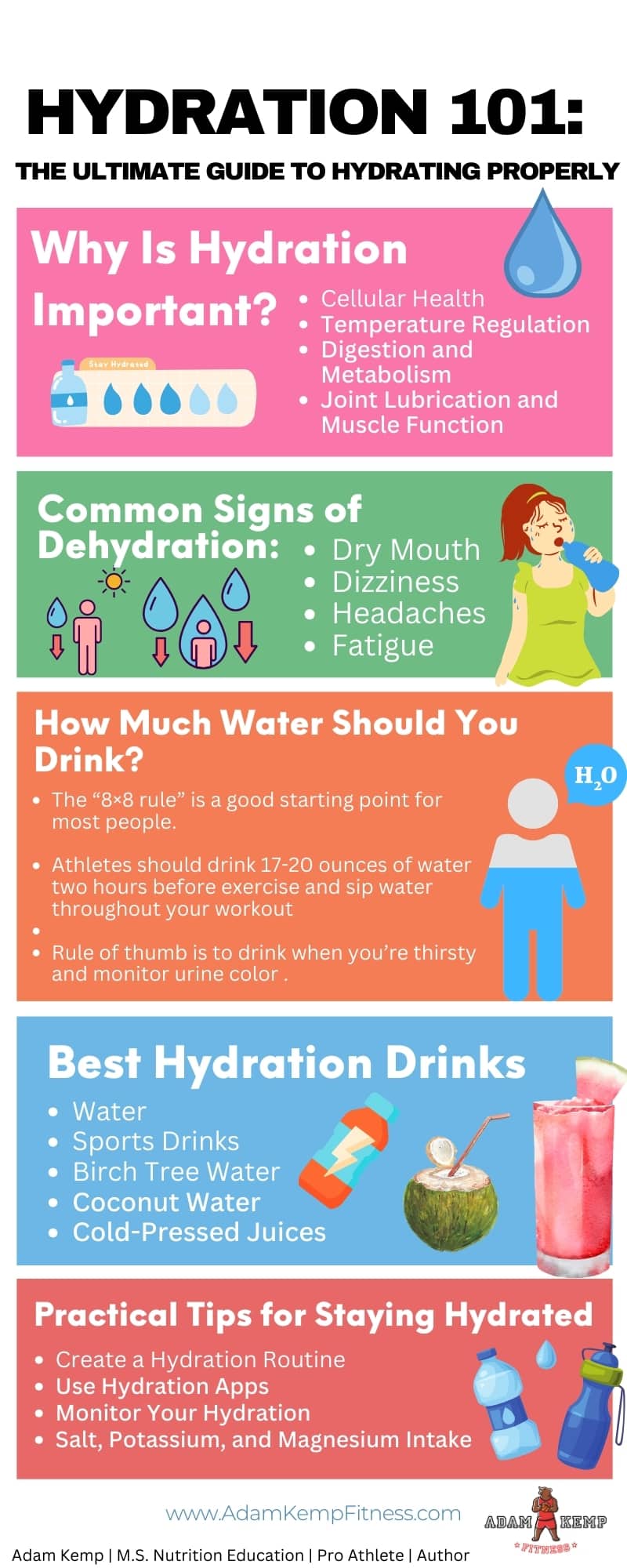
Water (Especially for Short or Moderate Workouts)
For many athletes—particularly those who train or compete for less than 60 minutes—plain water is more than sufficient to stay hydrated.
This is especially true for non-endurance athletes who don’t experience substantial sweat loss.
Natural spring water often contains trace minerals like calcium, magnesium, and potassium, which can support hydration without added sugars or synthetic ingredients.
Unless the activity is long in duration, performed in hot/humid conditions, or results in heavy sodium loss, water remains the safest, most cost-effective, and widely accessible hydration choice.
Traditional Sports Drinks
Formulated for athletic performance, traditional sports drinks contain a proven mix of sodium, potassium, and carbohydrates, helping to maintain electrolyte balance and fluid absorption during high-intensity or prolonged sessions.
They’re particularly useful for team sport athletes, endurance events, or training in extreme heat.
However, I don’t think traditional Gatorade or Powerade is a good option for most people because they are high in sugar and artificial ingredients.
Instead, I suggest healthier options like Gatorade Fit.
Homemade Electrolyte Drinks
DIY sports drinks made with filtered water, sea salt, natural sugars (like raw honey or maple syrup), and citrus juice offer customizable hydration without the artificial additives of commercial drinks.
This option lets athletes fine-tune their sodium intake based on individual sweat rates and dietary needs.
Oral Rehydration Solutions (ORS)
Products like Pedialyte or Liquid I.V. are based on clinical research and offer an optimized ratio of sodium, glucose, and potassium for rapid hydration.
These are especially effective for helping your body recover after exercise, rehydrating after gastrointestinal illness, or replenishing fluids during high heat and sweat loss.
Electrolyte Tablets or Powders
Electrolyte-infused tablets or powders are portable, low in calories, and can be added to any bottle of water.
They’re a great option for athletes who want to hydrate without added sugar, and many products allow you to adjust electrolyte content to fit your activity level.
My favorite option is Celsius Hydration Packets.
Last update on 2025-04-15 / This article includes affiliate links/Images via Amazon Product Advertising API. I may earn commissions on purchases made through these links.
Milk
Milk is a surprising but effective recovery beverage.
It contains fluid, electrolytes, high-quality protein, and carbohydrates, making it ideal for rehydration and muscle recovery after resistance or endurance training.
Research demonstrates that milk supports hydration as well—or better—than many commercial sports drinks.
For better digestibility, consider drinking goat milk instead of cow’s milk.
Watermelon Juice or Tart Cherry Juice
Natural juices like watermelon juice and tart cherry juice provide fluid along with functional compounds.
Watermelon juice offers L-citrulline, which may support blood flow and muscle recovery, while tart cherry juice is rich in polyphenols that help reduce muscle soreness and inflammation.
These juices work best when paired with sodium-rich foods or beverages to balance electrolyte needs.
Final Verdict: Is Coconut Water a Good Hydration Drink for Athletes?
Coconut water is a beneficial and refreshing beverage with legitimate advantages for hydration outside of peak training times.
As one of my general hydration tips for athletes, coconut water can be part of a well-rounded strategy—but only when used at the right times and in combination with other electrolyte-rich fluids that address the specific demands of training and recovery.
It can support general fluid intake and help meet daily potassium needs—a commonly under-consumed nutrient among athletes and the general public (Staruschenko, 2018).
However, when it comes to optimal sports hydration, particularly during or immediately after intense physical activity, coconut water should be used with care.
The lack of sodium and excess potassium pose real risks when hydration needs are highest.
Coconut water can be a valuable part of an athlete’s hydration strategy—but it should be strategically timed and complemented by other fluids that better match electrolyte needs in high-performance contexts.

